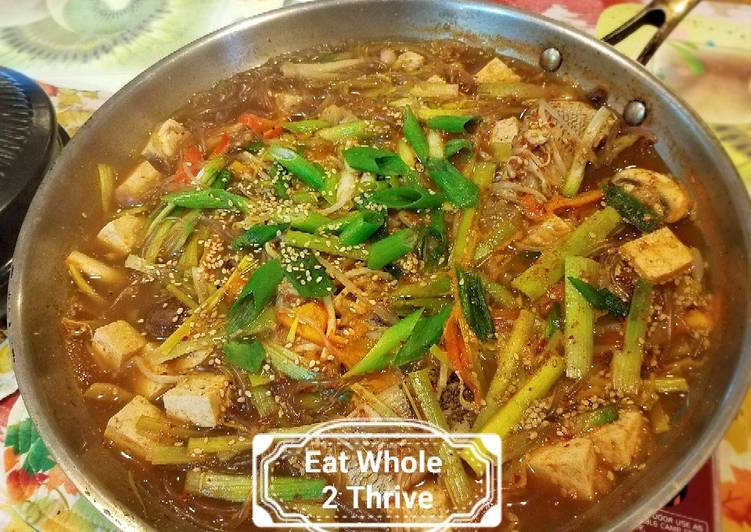
Hey everyone, it’s me again, Dan, welcome to our recipe site. Today, we’re going to prepare a special dish, spicy korean fish stew. One of my favorites. For mine, I am going to make it a little bit unique. This will be really delicious.
Spicy Korean fish stew is one of the most popular of recent trending meals on earth. It’s easy, it is fast, it tastes yummy. It’s enjoyed by millions daily. They are fine and they look fantastic. Spicy Korean fish stew is something that I have loved my whole life.
Black sea bass, cooking wine, daepa, doenjang, edible chrysanthemum, fish sauce, garlic, gochujang, green chili pepper, green onion, ground black pepper, hot pepper flakes, hot pepper paste, korean radish, large green onion, mirim, red chili pepper, soy sauce, soybean paste, water. The classic Korean fish stew is traditionally known as maeun-tang, which means "spicy" and "soup" or "stew" in the Korean language. In certain seafood restaurants in Korea and in some Korean restaurants abroad, you can choose your fish while it's still swimming. This is Korean comfort food: a hearty yet delicate fish soup.
To get started with this recipe, we must prepare a few ingredients. You can have spicy korean fish stew using 15 ingredients and 3 steps. Here is how you cook it.
The ingredients needed to make Spicy Korean fish stew:
- Take 1 lb whole fish(e.g. progie, bass, snapper, Flounder and etc)
- Get 2 cup mung sprouts
- Get 1/2 pack firm tofu
- Get 1 bundle mung glass noodle
- Get 1 medium onion
- Prepare 1 cup leek
- Make ready 2 green onions
- Get 2 Tsp korean hot pepper flakes
- Take 2 Tsp soy sauce
- Take 2 Tsp honey or brown rice syrup or sugar
- Make ready 1 Tsp gochujang
- Make ready 1 Tsp garlic paste
- Get 1 tsp ginger paste
- Make ready 1 Tsp white toasted sesame seeds
- Make ready 1 Tsp rice flour + 1/4 cup water to make starchy water
If you love seafood and spicy soup, Im sure you will absolutely love this stew, called maeuntang in Korean and spicy fish stew (or soup) in English. Lori: Keeping dried anchovies in her purse. Koreans have an expression, "shiwonhada" (시원하다)—literally, "intensely refreshing and cooling"—that describes Add spiciness to that party and you'll take shiwonhada to the next level. To me, the dish that perfectly captures this experience is the spicy fish stew called maeuntang (매운탕).
Steps to make Spicy Korean fish stew:
- Flaky fish such as flounder, porgie, bass, red snapper (yellow tails) or mullet are great good choice for this recipe. Fresh mackerel is also very good but salmon or tuna are not good here. Boil the cleaned fish covered by water for 5 minutes.
- While the fish is boiling, make the paste by mixing hot pepper flakes with soy sauce, garlic ginger paste, gochujang, honey and starchy water. Set aside.
- Discard half of the cooking water (fish stock can be used for other dishes). Add the bean sprouts, cubed firm tofu, sliced onion and mung bean glass noodle. Stir in half amount of the sauce. Bring it to a boil and reduce to simmer and cook for 10~ 15 minutes. Make sure the simmering the liquid is not too much or too little (soak up by the glass noodle). Adjust seasoning with the remainder paste. Top with green onion and toasted sesame seeds. Serve with bread or rice.
Koreans have an expression, "shiwonhada" (시원하다)—literally, "intensely refreshing and cooling"—that describes Add spiciness to that party and you'll take shiwonhada to the next level. To me, the dish that perfectly captures this experience is the spicy fish stew called maeuntang (매운탕). Korean maeuntang usually is made with anchovy stock, chrysanthemum greens and a whole fish that's been cut into pieces. And it's typically brought to the table simmering in a wide, shallow pot. Maeun Tang is another Korean dish widely enjoyed by many Koreans.
So that’s going to wrap this up for this exceptional food spicy korean fish stew recipe. Thank you very much for reading. I am confident you can make this at home. There’s gonna be interesting food at home recipes coming up. Remember to bookmark this page in your browser, and share it to your loved ones, friends and colleague. Thanks again for reading. Go on get cooking!

